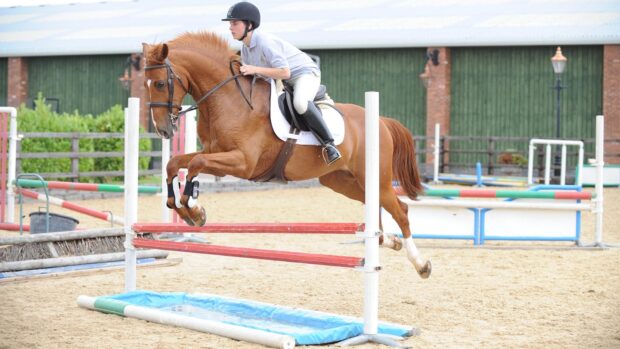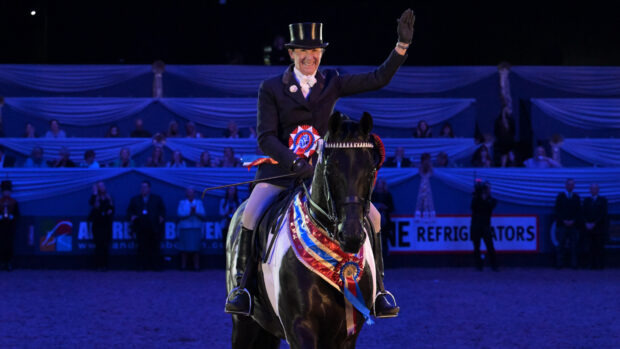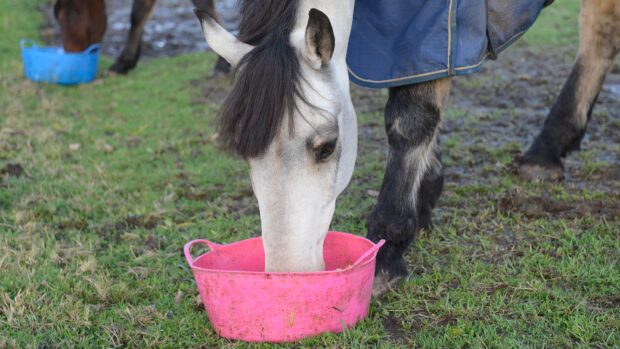You can guarantee that every equestrian has, at some point during a competition, had that sinking feeling when something hasn’t gone to plan. Poles fall, unexpected run-outs can happen, or not nailing a still square halt can lose valuable marks. If this means missing out on a top placing, or a win, this can result in a long drive home thinking of the “what ifs” and a shattered competitive mindset.
Riders know more than most that things don’t always follow the script – and while one unfortunate result might be put down to an unlucky day and brushed off, when these start to become regular occurrences it can soon become disheartening.
Consultant clinical psychologist with Changing Minds Dr Duncan Law, who has worked with top sports athletes, explains that when people are driven in sport, losing can be emotionally difficult.
“That’s not what you go into the sport to do,” he says. “But it depends on what you define as losing. For some it might not be about whether you’re on the podium or not. It might be your view that you’re competing against yourself rather than against other people. If that’s your drive, then that’s easier to manage.
“However, if you perceive loss as failure, then there will usually be a negative emotional response. At its extremes, the negative emotional response can become intolerable and you become highly avoidant.
“But if you don’t reflect on the loss, then you can’t learn from what you didn’t get right in the competition and maybe the one before that, leading to thinking you’ve had a losing streak, and you can’t improve.”
{"content":"PHA+QW5kIER1bmNhbiBzYXlzIHRoZSBvdGhlciBleHRyZW1lIGlzIHdoZXJlIHBlb3BsZSB0aGluayB0b28gbXVjaCBhYm91dCB0aGUgbG9zcy48L3A+CjxwPuKAnFRoZXkgZG8gdGhlIGxlYXJuaW5nIGJpdCwgYnV0IGNhcnJ5IG9uIHdvcnJ5aW5nIGFib3V0IGl0LCByYXRoZXIgdGhhbiB1c2luZyB0aGUgbGVhcm5pbmcgdG8gaGVscCB0aGVtIHBlcmZvcm0gYmV0dGVyLOKAnSBoZSBzYXlzLiDigJxXZSBtaWdodCBjYWxsIHRob3NlIHBlb3BsZSBvdmVydGhpbmtlcnMg4oCTIHRoZXkgY2Fu4oCZdCBsZWF2ZSBpdCBiZWhpbmQgYW5kIGl04oCZcyB0aGVyZSB3aXRoIHRoZW0gd2hlbiB0aGV5IHN0YXJ0IHRoZSBuZXh0IGNvbXBldGl0aW9uLjwvcD4KCjxwPuKAnFRoZSBvbmVzIHdobyBkbyB3ZWxsIGFyZSB0aG9zZSB3aG8gYXJlIGJldHdlZW4gdGhlc2UgdHdvIGV4dHJlbWVzIOKAkyB0aGV5IGNhbiBtYW5hZ2UgdGhlIGVtb3Rpb25hbCBwYWluIG9mIGxvc3MgdG8gcmVmbGVjdCBhbmQgbGVhcm4gaW4gb3JkZXIgdG8gZm9jdXMgb24gd2hhdCB0aGV5IG5lZWQgdG8gZG8gdG8gcGVyZm9ybSBiZXR0ZXIgaW4gdGhlIG5leHQgZXZlbnQu4oCdPC9wPgo8aDI+Q29tcGV0aXRpdmUgbWluZHNldCBmbHVjdHVhdGlvbnMg4oCcYXJlIG5vcm1hbOKAnTwvaDI+CjxwPldpbm5pbmcgaW4gaG9yc2Ugc3BvcnQgaXMgcmFyZSDigJMgdGFrZSBhbnkgdG9wIHJpZGVy4oCZcyByZWNvcmQgYW5kIHlvdeKAmWxsIGxpa2VseSBzZWUgZmFyIG1vcmUgbG9zc2VzIHRoYW4gdmljdG9yaWVzLCBhbmQgZHJlc3NhZ2UgcmlkZXIgPGEgaHJlZj0iL3RhZy9nYXJldGgtaHVnaGVzIiB0YXJnZXQ9Il9ibGFuayIgcmVsPSJub2ZvbGxvdyBub29wZW5lciI+R2FyZXRoIEh1Z2hlczwvYT4gc2F5cyBydW5zIG9mIGJhZCBsdWNrIGFyZSBjb21tb24gYXQgYWxsIGxldmVscy48L3A+Cgo8cD7igJxXZSBwdXQgb3VyIGhlYXJ0IGFuZCBzb3VsIGludG8gaG9yc2VzLCBzbyB3aGVuIGl0IGdvZXMgd3JvbmcsIHlvdSBjYW4gc29tZXRpbWVzIGdldCBpbnRvIGEgZGFyayBob2xlLOKAnSBoZSBzYXlzLiDigJxXZSBhbGwgaGF2ZSBkYXlzIHdoZXJlIHdlIGhhdmUgYSBncmVhdCByaWRlIGFuZCB0aGluayDigJhUaGF04oCZcyBpdCwgSeKAmW0gb2ZmIHRvIHRoZSBuZXh0IE9seW1waWNzLuKAmTwvcD4KPHA+4oCcQW5kIHRoZSBuZXh0IGRheSB5b3UgdGhpbmssIOKAmEkgY2Fu4oCZdCBldmVuIGNhbnRlciwgaXTigJlzIHRvbyBkaWZmaWN1bHQgYW5kIEkgZG9u4oCZdCBrbm93IHdoeSBJ4oCZbSBkb2luZyB0aGlzLuKAmSBJdOKAmXMgbm9ybWFsIHRvIGdvIHRocm91Z2ggdGhlc2UgcGVyaW9kcy7igJ08L3A+CjxwPjxiciAvPgo8ZGl2IGlkPSJhdHRhY2htZW50Xzg5MTEyNyIgc3R5bGU9IndpZHRoOiAxNDEwcHgiIGNsYXNzPSJ3cC1jYXB0aW9uIGFsaWdubm9uZSI+PGltZyBmZXRjaHByaW9yaXR5PSJoaWdoIiBkZWNvZGluZz0iYXN5bmMiIGFyaWEtZGVzY3JpYmVkYnk9ImNhcHRpb24tYXR0YWNobWVudC04OTExMjciIGNsYXNzPSJsYXp5bG9hZCBibHVyLXVwIHNpemUtZnVsbCB3cC1pbWFnZS04OTExMjciIGRhdGEtcHJvY2Vzc2VkIHNyYz0iaHR0cHM6Ly9rZXlhc3NldHMudGltZWluY3VrLm5ldC9pbnNwaXJld3AvbGl2ZS93cC1jb250ZW50L3VwbG9hZHMvc2l0ZXMvMTQvMjAxNy8wMy9uZXctaGgtcGxhY2Vob2xkZXItMjAweDIwMC5wbmciIGRhdGEtc3JjPSJodHRwczovL2tleWFzc2V0cy50aW1laW5jdWsubmV0L2luc3BpcmV3cC9saXZlL3dwLWNvbnRlbnQvdXBsb2Fkcy9zaXRlcy8xNC8yMDI1LzA1L0hBSDAwLmxiX3N0b2Nrc3ByaW5nMjIuTUVOVEFMSEVBTFRIMjAyMjA1MTdfMDIyNy5qcGciIGFsdD0iU2FkIHJpZGVyIHN0YW5kaW5nIGJ5IGhvcnNlIGluIHN0YWJsZS4iIHdpZHRoPSIxNDAwIiBoZWlnaHQ9Ijc4OCIgZGF0YS1zaXplcz0iYXV0byIgZGF0YS1zcmNzZXQ9Imh0dHBzOi8va2V5YXNzZXRzLnRpbWVpbmN1ay5uZXQvaW5zcGlyZXdwL2xpdmUvd3AtY29udGVudC91cGxvYWRzL3NpdGVzLzE0LzIwMjUvMDUvSEFIMDAubGJfc3RvY2tzcHJpbmcyMi5NRU5UQUxIRUFMVEgyMDIyMDUxN18wMjI3LmpwZyAxNDAwdywgaHR0cHM6Ly9rZXlhc3NldHMudGltZWluY3VrLm5ldC9pbnNwaXJld3AvbGl2ZS93cC1jb250ZW50L3VwbG9hZHMvc2l0ZXMvMTQvMjAyNS8wNS9IQUgwMC5sYl9zdG9ja3NwcmluZzIyLk1FTlRBTEhFQUxUSDIwMjIwNTE3XzAyMjctMzAweDE2OS5qcGcgMzAwdywgaHR0cHM6Ly9rZXlhc3NldHMudGltZWluY3VrLm5ldC9pbnNwaXJld3AvbGl2ZS93cC1jb250ZW50L3VwbG9hZHMvc2l0ZXMvMTQvMjAyNS8wNS9IQUgwMC5sYl9zdG9ja3NwcmluZzIyLk1FTlRBTEhFQUxUSDIwMjIwNTE3XzAyMjctNjMweDM1NS5qcGcgNjMwdywgaHR0cHM6Ly9rZXlhc3NldHMudGltZWluY3VrLm5ldC9pbnNwaXJld3AvbGl2ZS93cC1jb250ZW50L3VwbG9hZHMvc2l0ZXMvMTQvMjAyNS8wNS9IQUgwMC5sYl9zdG9ja3NwcmluZzIyLk1FTlRBTEhFQUxUSDIwMjIwNTE3XzAyMjctMTM1eDc2LmpwZyAxMzV3LCBodHRwczovL2tleWFzc2V0cy50aW1laW5jdWsubmV0L2luc3BpcmV3cC9saXZlL3dwLWNvbnRlbnQvdXBsb2Fkcy9zaXRlcy8xNC8yMDI1LzA1L0hBSDAwLmxiX3N0b2Nrc3ByaW5nMjIuTUVOVEFMSEVBTFRIMjAyMjA1MTdfMDIyNy0zMjB4MTgwLmpwZyAzMjB3LCBodHRwczovL2tleWFzc2V0cy50aW1laW5jdWsubmV0L2luc3BpcmV3cC9saXZlL3dwLWNvbnRlbnQvdXBsb2Fkcy9zaXRlcy8xNC8yMDI1LzA1L0hBSDAwLmxiX3N0b2Nrc3ByaW5nMjIuTUVOVEFMSEVBTFRIMjAyMjA1MTdfMDIyNy02MjB4MzQ5LmpwZyA2MjB3LCBodHRwczovL2tleWFzc2V0cy50aW1laW5jdWsubmV0L2luc3BpcmV3cC9saXZlL3dwLWNvbnRlbnQvdXBsb2Fkcy9zaXRlcy8xNC8yMDI1LzA1L0hBSDAwLmxiX3N0b2Nrc3ByaW5nMjIuTUVOVEFMSEVBTFRIMjAyMjA1MTdfMDIyNy05MjB4NTE4LmpwZyA5MjB3LCBodHRwczovL2tleWFzc2V0cy50aW1laW5jdWsubmV0L2luc3BpcmV3cC9saXZlL3dwLWNvbnRlbnQvdXBsb2Fkcy9zaXRlcy8xNC8yMDI1LzA1L0hBSDAwLmxiX3N0b2Nrc3ByaW5nMjIuTUVOVEFMSEVBTFRIMjAyMjA1MTdfMDIyNy0xMjIweDY4Ny5qcGcgMTIyMHciIHNpemVzPSIobWF4LXdpZHRoOiAxNDAwcHgpIDEwMHZ3LCAxNDAwcHgiIC8+PHAgaWQ9ImNhcHRpb24tYXR0YWNobWVudC04OTExMjciIGNsYXNzPSJ3cC1jYXB0aW9uLXRleHQiPlRyYWluaW5nIGhvcnNlcyBpcyBhIGdhbWUgb2YgaGlnaHMgYW5kIGxvd3MuIENyZWRpdDogQW5kcmV3IFN5ZGVuaGFtPC9wPjwvZGl2PjwvcD4KPHA+4oCcQ29uZmlkZW5jZSBjb21lcyB0aHJvdWdoIGdldHRpbmcgdGhpbmdzIHJpZ2h0OyB3aGVuIHlvdSBoYXZlIG1vcmUgYmFkIHJpZGVzIHRoYW4gZ29vZCwgaXTigJlzIHZlcnkgaGFyZCB0byBnZXQgeW91ciBjb25maWRlbmNlIGJhY2suIEFuZCB3aXRoIGhvcnNlcywgaXTigJlzIGEgc3BvcnQgdGhhdCB5b3UgYXMgYSByaWRlciBjYW4gZ2V0IGV2ZXJ5dGhpbmcgcmlnaHQgYW5kIGl0IHN0aWxsIGdvZXMgd3Jvbmcg4oCTIHRoYXTigJlzIHdoZXJlIGhvcnNlcyBhcmUgZXh0cmVtZWx5IGdyb3VuZGluZy48L3A+CjxwPuKAnElmIHlvdSBmaW5kIHlvdeKAmXJlIG5vdCBkb2luZyB3ZWxsIGFsbCB0aGUgdGltZSwgdGhlcmUgaXMgYSBwb2ludCB3aGVyZSB5b3UganVzdCBzb3J0IG9mIHRoaW5rLCB3aHkgYm90aGVyP+KAnTwvcD4KPHA+V2hlbiB0aGlzIGhhcHBlbnMsIEdhcmV0aCBiZWxpZXZlcyB0YWtpbmcgYSBzdGVwIGJhY2sgY2FuIGJlIG5lY2Vzc2FyeSB0byBtb3ZlIGZvcndhcmQuPC9wPgo8cD7igJxTdGVwIGJhY2sgdW50aWwgeW91IGZpbmQgYSBwbGFjZSB3aGVyZSB0aGUgY29uZmlkZW5jZSBjb21lcyBiYWNrLCB0aGVuIG1vdmUgZm9yd2FyZCBhZ2Fpbi4gVHJhaW5pbmcgaG9yc2VzIGlzIGxpa2UgYSBncmFwaCB0aGF04oCZcyBnb2luZyB1cCBhbmQgZG93biwgYnV0IHlvdeKAmXJlIGhvcGluZyB0aHJvdWdoIHRpbWUsIHlvdSBqdXN0IGdldCB0aGF0IGdlbnRsZSBpbXByb3ZlbWVudCzigJ0gaGUgc2F5cywgYWRkaW5nIHRoYXQgaXTigJlzIGhlbHBmdWwgdG8gZm9jdXMgb24gdGhhdCBpbXByb3ZlbWVudCwgcmF0aGVyIHRoYW4gdGhlIHBsYWNpbmcuPC9wPgo8cD7igJxJbiBkcmVzc2FnZSwgaWYgeW91ciBwZXJzb25hbCBiZXN0IGlzIDY1JSBhbmQgeW91IGNvbWUgb3V0IGFuZCBzY29yZSA2NiUgYW5kIHBsYWNlIDE1dGgsIHRoYXTigJlzIHN0aWxsIHlvdXIgZ29sZCBtZWRhbC4gSWYgeW914oCZdmUgYmVlbiBhdmVyYWdpbmcgNzAlIGJ1dCB5b3Ugd2luIHRoZSBjbGFzcyBvbiA2NSUsIHRoYXTigJlzIG5vdCBhbiBpbXByb3ZlbWVudCzigJ0gaGUgc2F5cy48L3A+CjxkaXYgaWQ9ImF0dGFjaG1lbnRfODkxMTM0IiBzdHlsZT0id2lkdGg6IDE0MTBweCIgY2xhc3M9IndwLWNhcHRpb24gYWxpZ25ub25lIj48aW1nIGRlY29kaW5nPSJhc3luYyIgYXJpYS1kZXNjcmliZWRieT0iY2FwdGlvbi1hdHRhY2htZW50LTg5MTEzNCIgY2xhc3M9Imxhenlsb2FkIGJsdXItdXAgc2l6ZS1mdWxsIHdwLWltYWdlLTg5MTEzNCIgZGF0YS1wcm9jZXNzZWQgc3JjPSJodHRwczovL2tleWFzc2V0cy50aW1laW5jdWsubmV0L2luc3BpcmV3cC9saXZlL3dwLWNvbnRlbnQvdXBsb2Fkcy9zaXRlcy8xNC8yMDE3LzAzL25ldy1oaC1wbGFjZWhvbGRlci0yMDB4MjAwLnBuZyIgZGF0YS1zcmM9Imh0dHBzOi8va2V5YXNzZXRzLnRpbWVpbmN1ay5uZXQvaW5zcGlyZXdwL2xpdmUvd3AtY29udGVudC91cGxvYWRzL3NpdGVzLzE0LzIwMjUvMDUvMlJSSEtQNi5qcGciIGFsdD0iR2FyZXRoIEh1Z2hlcyBzbWlsaW5nIGF0IGVuZCBvZiB0ZXN0IGF0IDIwMjMgRXVyb3BlYW4gQ2hhbXBpb25zaGlwczogY29tcGV0aXRpdmUgbWluZHNldCIgd2lkdGg9IjE0MDAiIGhlaWdodD0iODk4IiBkYXRhLXNpemVzPSJhdXRvIiBkYXRhLXNyY3NldD0iaHR0cHM6Ly9rZXlhc3NldHMudGltZWluY3VrLm5ldC9pbnNwaXJld3AvbGl2ZS93cC1jb250ZW50L3VwbG9hZHMvc2l0ZXMvMTQvMjAyNS8wNS8yUlJIS1A2LmpwZyAxNDAwdywgaHR0cHM6Ly9rZXlhc3NldHMudGltZWluY3VrLm5ldC9pbnNwaXJld3AvbGl2ZS93cC1jb250ZW50L3VwbG9hZHMvc2l0ZXMvMTQvMjAyNS8wNS8yUlJIS1A2LTMwMHgxOTIuanBnIDMwMHcsIGh0dHBzOi8va2V5YXNzZXRzLnRpbWVpbmN1ay5uZXQvaW5zcGlyZXdwL2xpdmUvd3AtY29udGVudC91cGxvYWRzL3NpdGVzLzE0LzIwMjUvMDUvMlJSSEtQNi02MjR4NDAwLmpwZyA2MjR3LCBodHRwczovL2tleWFzc2V0cy50aW1laW5jdWsubmV0L2luc3BpcmV3cC9saXZlL3dwLWNvbnRlbnQvdXBsb2Fkcy9zaXRlcy8xNC8yMDI1LzA1LzJSUkhLUDYtMTM1eDg3LmpwZyAxMzV3LCBodHRwczovL2tleWFzc2V0cy50aW1laW5jdWsubmV0L2luc3BpcmV3cC9saXZlL3dwLWNvbnRlbnQvdXBsb2Fkcy9zaXRlcy8xNC8yMDI1LzA1LzJSUkhLUDYtMzIweDIwNS5qcGcgMzIwdywgaHR0cHM6Ly9rZXlhc3NldHMudGltZWluY3VrLm5ldC9pbnNwaXJld3AvbGl2ZS93cC1jb250ZW50L3VwbG9hZHMvc2l0ZXMvMTQvMjAyNS8wNS8yUlJIS1A2LTYyMHgzOTguanBnIDYyMHcsIGh0dHBzOi8va2V5YXNzZXRzLnRpbWVpbmN1ay5uZXQvaW5zcGlyZXdwL2xpdmUvd3AtY29udGVudC91cGxvYWRzL3NpdGVzLzE0LzIwMjUvMDUvMlJSSEtQNi05MjB4NTkwLmpwZyA5MjB3LCBodHRwczovL2tleWFzc2V0cy50aW1laW5jdWsubmV0L2luc3BpcmV3cC9saXZlL3dwLWNvbnRlbnQvdXBsb2Fkcy9zaXRlcy8xNC8yMDI1LzA1LzJSUkhLUDYtMTIyMHg3ODMuanBnIDEyMjB3IiBzaXplcz0iKG1heC13aWR0aDogMTQwMHB4KSAxMDB2dywgMTQwMHB4IiAvPjxwIGlkPSJjYXB0aW9uLWF0dGFjaG1lbnQtODkxMTM0IiBjbGFzcz0id3AtY2FwdGlvbi10ZXh0Ij5HYXJldGggSHVnaGVzIHNtaWxlcyBhdCB0aGUgZW5kIG9mIGEgZ3JlYXQgdGVzdCBhdCB0aGUgMjAyMyBFdXJvcGVhbiBDaGFtcGlvbnNoaXBzIG9uIENsYXNzaWMgQnJpb2xpbmNhLiBDcmVkaXQ6IEFsYW15PC9wPjwvZGl2Pgo8aDI+U3VjY2VzcywgY29udHJvbGxhYmxlcyBhbmQgcHJvY2Vzc2VzPC9oMj4KPHA+RHIgQ2hyaXMgQmVhdW1vbnQsIGEgc2VuaW9yIHNwb3J0cyBwc3ljaG9sb2dpc3Qgd2l0aCBDaGFuZ2luZyBNaW5kcyB3aG8gaGFzIHdvcmtlZCB3aXRoIE9seW1waWMgYW5kIFBhcmFseW1waWMgYXRobGV0ZXMsIGFza3MgcGVvcGxlIHdoYXQgdGhleSBkZWZpbmUgYXMgc3VjY2Vzcy48L3A+CjxwPuKAnFNvbWV0aW1lcyBwZW9wbGUgY2FuIGdvIGludG8gY29tcGV0aXRpb25zIHdpdGhvdXQgYmVpbmcgcmVhbGx5IGNsZWFyIGFib3V0IHdoYXQgdGhleSBhcmUgdHJ5aW5nIHRvIGFjaGlldmUs4oCdIGhlIHNheXMuIOKAnEhhdmluZyBjbGFyaXR5IG9uIHlvdXIgZ29hbHMgYW5kIGV4cGVjdGF0aW9ucyBpcyByZWFsbHkgaW1wb3J0YW50IHRvIGhlbHAgdGhlIHBlcmZvcm1hbmNlLjwvcD4KPHA+4oCcU3BvcnQgaXMgYWJvdXQgb3V0Y29tZXMsIGJ1dCB0aGUgdGhpbmcgYWJvdXQgb3V0Y29tZXMgaXMgdGhhdCB0aGV54oCZcmUgbm90IGNvbnRyb2xsYWJsZS4gT2Z0ZW4sIHBlb3BsZSBhbGxvdyB0aGVzZSB1bmNvbnRyb2xsYWJsZSB0aGluZ3MgdG8gaGF2ZSBhIGh1Z2UgaW1wYWN0IG9uIHRoZWlyIGVtb3Rpb25zLCB3aGljaCBjYW4gYmUgcG9zaXRpdmUgYW5kIG5lZ2F0aXZlLjwvcD4KPHA+4oCcSWYgeW91IHdpbiwgeW91IGdldCBhIGdyZWF0IGhpZ2gsIGJ1dCB3aGVuIHlvdSBsb3NlIHlvdSBjYW4gaGF2ZSBncmVhdCBsb3dzLCBidXQgdGhvc2UgZW1vdGlvbnMgYXJlIGJvdGggY29ubmVjdGVkIHRvIGFuIHVuY29udHJvbGxhYmxlIGZhY3Rvci7igJ08L3A+CjxwPlRvIGNvbWJhdCB0aGlzLCBDaHJpcyByZWNvbW1lbmRzIHRoaW5raW5nIGFib3V0IHRoZSBmYWN0b3JzIHlvdSBhcmUgaW4gY29udHJvbCBvZiBhbmQgdG8gZm9jdXMgb24gdGhlIOKAnHRocmVlIFBz4oCdOiBwcmVwYXJhdGlvbiwgcGxhbm5pbmcgYW5kIHByb2Nlc3Nlcy48L3A+CjxwPuKAnEkgd2lsbCBhc2sgcGVvcGxlLCDigJhBcmUgeW91IHJlYWxseSBjbGVhciBvbiB5b3VyIHByZXBhcmF0aW9uIGFuZCB3aGF0IGRvIHlvdSBuZWVkIHRvIGJlIGFzIHN1Y2Nlc3NmdWwgYXMgcG9zc2libGU\/IFRoYXQgbWlnaHQgYmUgaW4geW91ciB0cmFpbmluZy4gVGhlbiwg4oCYV2hhdOKAmXMgeW91ciBwbGFuIOKAkyBhcmUgeW91IGNsZWFyIGluIHdoYXQgeW91IGFyZSB0cnlpbmcgdG8gYWNoaWV2ZT\/igJk8L3A+CjxwPuKAnFRoZW4gdGhpbmsgYWJvdXQgcHJvY2Vzc2VzOyB0aGUgdGhpbmdzIHRoYXQgeW91IGNhbiBkbyB0aGF0IHlvdeKAmXJlIGluIGNvbnRyb2wgb2YgdG8gZ2l2ZSB0aGUgYmVzdCBjaGFuY2UgdG8gYmUgc3VjY2Vzc2Z1bC4gVGhhdCBjb3VsZCBiZSBmb2N1c2luZyBvbiBob3cgeW91IHN0YXJ0IGluIGEgY29tcGV0aXRpb24sIHRvIHRoZSB2YXJpb3VzIHBoYXNlcy48L3A+CjxwPuKAnElmIHlvdSBuYWlsIHlvdXIgcHJlcGFyYXRpb24sIGJlIGNsZWFyIG9uIHlvdXIgcGxhbnMgYW5kIHVuZGVyc3RhbmQgeW91ciBwcm9jZXNzZXMsIHlvdSBzZXQgeW91cnNlbGYgdXAgaW4gdGhlIGJlc3QgcG9zaXRpb24gZm9yIHN1Y2Nlc3Mu4oCdPC9wPgo8aDI+UHJlcGFyYXRpb24gbGVhZHMgdG8gYSBjb25maWRlbnQgY29tcGV0aXRpdmUgbWluZHNldDwvaDI+CjxwPkV2ZW50IHJpZGVyIDxhIGhyZWY9Ii90YWcvcGlwcGEtZnVubmVsbCIgdGFyZ2V0PSJfYmxhbmsiIHJlbD0ibm9mb2xsb3cgbm9vcGVuZXIiPlBpcHBhIEZ1bm5lbGw8L2E+LCB3aG8gZGVzY3JpYmVzIGhlcnNlbGYgYXMgYW4gb3ZlcnRoaW5rZXIgYW5kIGhhcyBiZWVuIG9wZW4gYWJvdXQgY29uZmlkZW5jZSBpc3N1ZXMgZHVyaW5nIGhlciBjYXJlZXIsIHBsYWNlcyBhIGh1Z2UgZW1waGFzaXMgb24gcHJlcGFyYXRpb24uPC9wPgo8cD7igJxXaGF0IGdpdmVzIG1lIHRoZSBtb3N0IGNvbmZpZGVuY2UgaXMgdHJ1c3RpbmcgbXkgc3lzdGVtLCBhbmQgdGhhdCBzeXN0ZW0gaXMgbGVhdmluZyBubyBzdG9uZSB1bnR1cm5lZCzigJ0gc2hlIHNheXMuIOKAnEZvciBleGFtcGxlLCBJIGtub3cgbXkgaG9yc2VzIGFsbCBhdCBzb21lIHN0YWdlIGhhdmUgZXhwZXJpZW5jZSBvZiBydW5uaW5nIGluIHRoZSB3ZXQgZ3JvdW5kLCBiZWNhdXNlIEkgZG9u4oCZdCB3YW50IHRvIGdvIGludG8gYSBiaWcgdGhyZWUtZGF5IHdoZXJlIHRoZSBnb2luZyBpcyB0b3VnaCBhbmQgSSB0aGluayB0aGlzIGhvcnNlIGhhcyBuZXZlciBleHBlcmllbmNlZCB0aGlzLjwvcD4KPHA+4oCcRHVyaW5nIGEgY29tcGV0aXRpb24geW91IGRvbuKAmXQgd2FudCB0byBiZSBnb2luZywg4oCYSSB3aXNoIEnigJlkIGRvbmUgdGhhdCBpbiB0aGUgcHJlcGFyYXRpb24u4oCZIElmIHlvdSBrbm93IHRoYXTigJlzIGNvdmVyZWQsIHRoZW4geW91IGNhbiBnbyBpbiB3aXRoIHNvIG11Y2ggbW9yZSBjb25maWRlbmNlLjwvcD4KPHA+4oCcQnV0IHRoZXJlIGFyZSBhbHNvIHNpdHVhdGlvbnMgd2hlcmUgeW91IGhhdmUgdG8gdHVybiB0aGluZ3MgaW50byBhIHBvc2l0aXZlLiBJIGhhZCBhIGZhbGwgYW5kIGhhZCBhIHBsYXN0ZXIgb24gbXkgbGVnIGZvciB0d28tYW5kLWEtaGFsZiB3ZWVrcyBiZWZvcmUgdGhlIGZpcnN0IEJhZG1pbnRvbiB0aGF0IFN1cHJlbWUgUm9jayB3b24uIEkgaGFkIGNvbXBsZXRlbHkgdGhlIHdyb25nIHByZXBhcmF0aW9uLCBidXQgeW91IGhhdmUgdG8gdHVybiB0aGluZ3MgaW50byBhIHBvc2l0aXZlIHJhdGhlciB0aGFuIGR3ZWxsLCBteSBwb3NpdGl2ZSB3YXMgdGhhdCBJIHdhcyBnb2luZyBpbnRvIEJhZG1pbnRvbiB3ZWxsIHJlc3RlZC7igJ08L3A+CjxwPkJ1dCBQaXBwYSBzYXlzIGl04oCZcyBodW1hbiBuYXR1cmUgdG8gbG9zZSBjb25maWRlbmNlIGF0IHNvbWUgc3RhZ2UuPC9wPgo8cD7igJxZb3UgY2FuIGxvc2UgeW91ciBjb25maWRlbmNlIGluIG1hbnkgd2F5cy4gSXQgbWlnaHQgbm90IGJlIGZyb20gYSBiYWQgcmVzdWx0IG9yIGEgZmFsbCwgaXQgbWlnaHQgYmUgdGhhdCB5b3XigJl2ZSBoYWQgYW4gaW5qdXJ5IGFuZCB5b3XigJlyZSByaWRpbmcgaW4gcGFpbiwgb3IgeW914oCZdmUgaGFkIGEgcnVuIG9mIGhvcnNlcyB3aXRoIHNvdW5kbmVzcyBpc3N1ZXMsIGFuZCB5b3UgbG9zZSBjb25maWRlbmNlIGluIHRoZSB3YXkgeW91IHJpZGUgdGhlbSzigJ0gc2hlIGV4cGxhaW5zLjwvcD4KPHA+4oCcV2hlbiBJ4oCZdmUgbG9zdCBjb25maWRlbmNlLCB3aGljaCBJIGhhdmUgbWFueSB0aW1lcywgSeKAmXZlIGZhbGxlbiBpbnRvIHRoZSB0cmFwIG9mIGxvc2luZyBiZWxpZWYgaW4gbXkganVkZ2VtZW50LiBJdCBjYW4gYmUgZWFzeSB0byBhc2sgbG90cyBvZiBwZW9wbGUgZm9yIGFkdmljZSBhbmQgeW91IGdvIGF3YXkgZnJvbSB0cnlpbmcgdG8gd29yayBpdCBvdXQgZm9yIHlvdXJzZWxmLjwvcD4KPHA+4oCcQnV0IEnigJl2ZSBmb3VuZCBodWdlIHN0cmVuZ3RoIGluIGFuYWx5c2luZyB3aHkgc29tZXRoaW5n4oCZcyBnb25lIHdyb25nLCBvciBpdOKAmXMgY29uc2lzdGVudGx5IGdvaW5nIHdyb25nLCBhbmQgdmVyeSBvZnRlbiB0aGF0IGxpbmtzIGJhY2sgdG8gc29tZXdoZXJlIGluIHlvdXIgdHJhaW5pbmcgb3IgdGhlIGJhc2ljcy7igJ08L3A+CjxwPkF1c3RyYWxpYW4gZml2ZS1zdGFyIGV2ZW50IHJpZGVyIHR1cm5lZCBjb2FjaCwgPGEgaHJlZj0iL3RhZy9wYXVsLXRhcG5lciIgdGFyZ2V0PSJfYmxhbmsiIHJlbD0ibm9mb2xsb3cgbm9vcGVuZXIiPlBhdWwgVGFwbmVyPC9hPiwgZW5qb3llZCBwbGVudHkgb2YgaGlnaHMgZHVyaW5nIGhpcyBjb21wZXRpdGlvbiBjYXJlZXIsIGJ1dCBoZSBleHBlcmllbmNlZCBoaXMgc2hhcmUgb2YgY2hhbGxlbmdlcy4gSGUgYmVsaWV2ZXMgYSBjb21tb24gZmFjdG9yIGFtb25nIHN1Y2Nlc3NmdWwgcmlkZXJzIGlzIGhhdmluZyByZXNpbGllbmNlLjwvcD4KPGRpdiBpZD0iYXR0YWNobWVudF84OTExMzciIHN0eWxlPSJ3aWR0aDogMTQxMHB4IiBjbGFzcz0id3AtY2FwdGlvbiBhbGlnbm5vbmUiPjxpbWcgZGVjb2Rpbmc9ImFzeW5jIiBhcmlhLWRlc2NyaWJlZGJ5PSJjYXB0aW9uLWF0dGFjaG1lbnQtODkxMTM3IiBjbGFzcz0ibGF6eWxvYWQgYmx1ci11cCBzaXplLWZ1bGwgd3AtaW1hZ2UtODkxMTM3IiBkYXRhLXByb2Nlc3NlZCBzcmM9Imh0dHBzOi8va2V5YXNzZXRzLnRpbWVpbmN1ay5uZXQvaW5zcGlyZXdwL2xpdmUvd3AtY29udGVudC91cGxvYWRzL3NpdGVzLzE0LzIwMTcvMDMvbmV3LWhoLXBsYWNlaG9sZGVyLTIwMHgyMDAucG5nIiBkYXRhLXNyYz0iaHR0cHM6Ly9rZXlhc3NldHMudGltZWluY3VrLm5ldC9pbnNwaXJld3AvbGl2ZS93cC1jb250ZW50L3VwbG9hZHMvc2l0ZXMvMTQvMjAyNS8wNS9HQ0ZIMjEuanBnIiBhbHQ9IlBhdWwgVGFwbmVyIHdpbnMgQmFkbWludG9uIGluIDIwMTAsIGxhcCBvZiBob25vdXIiIHdpZHRoPSIxNDAwIiBoZWlnaHQ9IjEwMzMiIGRhdGEtc2l6ZXM9ImF1dG8iIGRhdGEtc3Jjc2V0PSJodHRwczovL2tleWFzc2V0cy50aW1laW5jdWsubmV0L2luc3BpcmV3cC9saXZlL3dwLWNvbnRlbnQvdXBsb2Fkcy9zaXRlcy8xNC8yMDI1LzA1L0dDRkgyMS5qcGcgMTQwMHcsIGh0dHBzOi8va2V5YXNzZXRzLnRpbWVpbmN1ay5uZXQvaW5zcGlyZXdwL2xpdmUvd3AtY29udGVudC91cGxvYWRzL3NpdGVzLzE0LzIwMjUvMDUvR0NGSDIxLTI3MXgyMDAuanBnIDI3MXcsIGh0dHBzOi8va2V5YXNzZXRzLnRpbWVpbmN1ay5uZXQvaW5zcGlyZXdwL2xpdmUvd3AtY29udGVudC91cGxvYWRzL3NpdGVzLzE0LzIwMjUvMDUvR0NGSDIxLTU0Mng0MDAuanBnIDU0MncsIGh0dHBzOi8va2V5YXNzZXRzLnRpbWVpbmN1ay5uZXQvaW5zcGlyZXdwL2xpdmUvd3AtY29udGVudC91cGxvYWRzL3NpdGVzLzE0LzIwMjUvMDUvR0NGSDIxLTEzNXgxMDAuanBnIDEzNXcsIGh0dHBzOi8va2V5YXNzZXRzLnRpbWVpbmN1ay5uZXQvaW5zcGlyZXdwL2xpdmUvd3AtY29udGVudC91cGxvYWRzL3NpdGVzLzE0LzIwMjUvMDUvR0NGSDIxLTMyMHgyMzYuanBnIDMyMHcsIGh0dHBzOi8va2V5YXNzZXRzLnRpbWVpbmN1ay5uZXQvaW5zcGlyZXdwL2xpdmUvd3AtY29udGVudC91cGxvYWRzL3NpdGVzLzE0LzIwMjUvMDUvR0NGSDIxLTYyMHg0NTcuanBnIDYyMHcsIGh0dHBzOi8va2V5YXNzZXRzLnRpbWVpbmN1ay5uZXQvaW5zcGlyZXdwL2xpdmUvd3AtY29udGVudC91cGxvYWRzL3NpdGVzLzE0LzIwMjUvMDUvR0NGSDIxLTkyMHg2NzkuanBnIDkyMHcsIGh0dHBzOi8va2V5YXNzZXRzLnRpbWVpbmN1ay5uZXQvaW5zcGlyZXdwL2xpdmUvd3AtY29udGVudC91cGxvYWRzL3NpdGVzLzE0LzIwMjUvMDUvR0NGSDIxLTEyMjB4OTAwLmpwZyAxMjIwdyIgc2l6ZXM9IihtYXgtd2lkdGg6IDE0MDBweCkgMTAwdncsIDE0MDBweCIgLz48cCBpZD0iY2FwdGlvbi1hdHRhY2htZW50LTg5MTEzNyIgY2xhc3M9IndwLWNhcHRpb24tdGV4dCI+QSBkYXkgd2hlbiBpdCBhbGwgd2VudCByaWdodC4gVGhlIEJhZG1pbnRvbiAyMDEwIHdpbm5lciBQYXVsIFRhcG5lciBzYXlzIHJlc2lsaWVuY2UgaW4gdGhlIGZhY2Ugb2YgaW5ldml0YWJsZSBkaXNhcHBvaW50bWVudCBpcyBrZXkuIENyZWRpdDogQWxhbXk8L3A+PC9kaXY+CjxwPuKAnEFueWJvZHkgd2hvIGlzIHN1Y2Nlc3NmdWwgaGFzIHRoaXMgaW4gYnVja2V0bG9hZHMs4oCdIGhlIHNheXMuIOKAnFlvdSBtaWdodCBvbmx5IHJlbWVtYmVyIGEgZmFtb3VzIHJpZGVyIGZvciBhbGwgdGhlaXIgc3VjY2Vzc2VzLCBidXQgc3RhdGlzdGljYWxseSB0aGV54oCZbGwgaGF2ZSBiZWVuIG1vcmUgdW5zdWNjZXNzZnVsLjwvcD4KPHA+4oCcT25lIGV4YW1wbGUgaXMgam9ja2V5IDxhIGhyZWY9Ii90YWcvYXAtbWNjb3kiIHRhcmdldD0iX2JsYW5rIiByZWw9Im5vZm9sbG93IG5vb3BlbmVyIj5BUCBNY0NveTwvYT4uIEhlIG1pZ2h0IGhhdmUgYmVlbiB0aGUgbW9zdCB3aW5uaW5nIHJpZGVyIGZvciBob3cgZXZlciBtYW55IHllYXJzLCBidXQgaWYgeW91IGxvb2sgYXQgaXQgZnJvbSB0aGUgb3RoZXIgcGVyc3BlY3RpdmUsIGhlIHdhcyBhbHNvIHRoZSByaWRlciBvZiB0aGUgbW9zdCBsb3NlcnMgaW4gYXMgbWFueSB5ZWFycy4gSXQgZG9lc27igJl0IG1hdHRlciBob3cgc3VjY2Vzc2Z1bCB5b3UgYXJlLCB5b3UgaGF2ZSB0byBoYXZlIHRoYXQgcmVzaWxpZW5jZSB0byBiZSBhYmxlIHRvIGxvb2sgYXQgaXQgcG9zaXRpdmVseS7igJ08L3A+CjxwPlBhdWwgc2F5cyBiZWluZyBhZGFwdGFibGUgdG8gZGlmZmVyZW50IHNpdHVhdGlvbnMgaXMga2V5IHRvIG92ZXJjb21pbmcgaHVyZGxlcy48L3A+CjxwPuKAnEkgd291bGQgc3RhcnQgb24gcGxhbiBBLCBidXQgbm9ybWFsbHkgZW5kIHVwIGF0IHBsYW4gWiBieSB0aGUgZW5kIG9mIGV2ZXJ5IHNlYXNvbizigJ0gaGUgc2F5cy4g4oCcSSBoYXZlIG1hbnkgc3RvcmllcyB3aGVyZSB0aGluZ3MgaGF2ZW7igJl0IGdvbmUgdG8gcGxhbiwgYnV0IGl0IGNhbiBtYWtlIHlvdSBzdHJvbmdlciwgaWYgeW914oCZcmUgd2lsbGluZyB0byBsZWFybiBmcm9tIGl0LjwvcD4KPHA+4oCcVGhlcmXigJlzIGEgZmFtb3VzIHNheWluZzog4oCYVGhlIGRlZmluaXRpb24gb2YgaW5zYW5pdHkgaXMgdG8gZG8gdGhlIHNhbWUgdGhpbmcgb3ZlciBhbmQgb3ZlciBidXQgZXhwZWN0aW5nIGRpZmZlcmVudCByZXN1bHRzLuKAmSBZb3UgaGF2ZSB0byBiZSB3aWxsaW5nIHRvIGNvbnN0YW50bHkgYXNzZXNzIGFuZCB0d2VhayB3aGF0IHlvdeKAmXJlIGRvaW5nIHRvIGdldCBhIGxpdHRsZSBiaXQgYmV0dGVyIGV2ZXJ5IHRpbWUuPC9wPgo8cD7igJxJdCBkb2VzbuKAmXQgbmVlZCB0byBiZSBtYXNzaXZlIGNoYW5nZXMsIGJ1dCBkb27igJl0IGJlIHNvIHN0dWJib3JuIHRoYXQgeW91IGdldCBzdHVjayBpbiB5b3VyIHdheSBvZiBkb2luZyBzb21ldGhpbmcgYW5kIHRoaW5rIHRoYXQgdGhhdCBzaG91bGQgZ2V0IHJlc3VsdHMu4oCdPC9wPgo8aDI+4oCcTm8gZmFpbHVyZSwgb25seSBmZWVkYmFja+KAnTwvaDI+CjxwPlNwb3J0cyBwc3ljaG9sb2d5IGNvYWNoIERlYmJpZSBIaWxsIG9mIEFoZWFkIEZvciBMaWZlLCB3aG8gd29ya3Mgd2l0aCBlcXVlc3RyaWFucyBhY3Jvc3MgZGlzY2lwbGluZXMgaW5jbHVkaW5nIE9seW1waWMgZHJlc3NhZ2UgcmlkZXIgQWJpIEx5bGUsIHByYWN0aXNlcyBhIOKAnG5vIGZhaWx1cmUsIG9ubHkgZmVlZGJhY2vigJ0gYXBwcm9hY2guIEFuZCB3aGVuIGhlbHBpbmcgcmlkZXJzLCBvbmUgdGVjaG5pcXVlIHNoZSB1c2VzIGlzIHRoZSDigJxtZW50YWwgc3RyZW5ndGggdHJpYW5nbGXigJ0uPC9wPgo8cD7igJxUaGlzIHRyaWFuZ2xlIGlzIG1hZGUgdXAgb2YgbW90aXZhdGlvbiwgZm9jdXMgYW5kIGVtb3Rpb25hbCBiYWxhbmNlLOKAnSBEZWJiaWUgZXhwbGFpbnMuIOKAnE1vdGl2YXRpb24gaXMgYXJvdW5kIHlvdXIgdmFsdWVzIGFuZCBiZWxpZWZzOyBpZiB5b3UgYmVsaWV2ZSB5b3XigJlyZSBnb2luZyB0byBiZSBydWJiaXNoIG9yIGZhbGwgb2ZmLCB0aGF04oCZcyB3aGF04oCZcyBnb2luZyB0byBoYXBwZW4uIFNvIGJlbGlldmUgdGhhdCB5b3UgYXJlIGFibGUgdG8gZG8gdGhpcywgYmVjYXVzZSB5b3XigJl2ZSBkb25lIHRoZSB0cmFpbmluZyBmb3IgaXQuIEFuZCB0aGUgdmFsdWUgaXMgdGhhdCBpdCBtYWtlcyB5b3UgaGFwcHkuPC9wPgo8cD7igJxUaGVuIGlmIHdlIGNvbnNpZGVyIHRoZSBmb2N1cyBwYXJ0LCB0aGF04oCZcyBrbm93aW5nIHdoYXQgeW91IHdhbnQgdG8gYWNoaWV2ZSBhbmQgdGhlIHByb2Nlc3MgdG8gZG8gaXQuIEZvciBleGFtcGxlLCBrbm93aW5nIGhvdyB5b3XigJlyZSBnb2luZyB0byByaWRlIHRoZSBjb3Vyc2UsIG9yIHRlc3QsIGFuZCB2aXNpb25pbmcgbGlua2luZyB0aGUgZmVuY2VzIG9yIG1vdmVtZW50cyB0b2dldGhlci48L3A+CjxwPuKAnFRoZSBlbW90aW9uYWwgYmFsYW5jZSBpcyBhYm91dCB3aGF0IHdlbnQgb24gaW4gdGhlIHBhc3QgYW5kIHdoYXTigJlzIGdvaW5nIHRvIGhhcHBlbiBpbiB0aGUgZnV0dXJlLiBXZSBuZWVkIHRvIHN0YXkgaW4gdGhlIHByZXNlbnQgYW5kIGJlbGlldmUgdGhhdCB3ZSBjYW4gZG8gdGhhdCB0b2RheSwgYnkgZm9jdXNpbmcgb24gdGhhdCBwcm9jZXNzLuKAnTwvcD4KPHA+V2hlbiBmZWVsaW5nIG5lcnZvdXMsIERlYmJpZSByZWNvbW1lbmRzIGZvY3VzaW5nIG9uIHlvdXIgcGVyaXBoZXJhbCB2aXNpb24uPC9wPgo8cD7igJxXZSB0ZW5kIHRvIGZvY3VzIG9uIHdoYXTigJlzIGluIGZyb250IG9mIHVzIGFuZCB0aGlzIGtpY2stc3RhcnRzIHRoYXQgZmlnaHQsIGZsaWdodCBvciBmcmVlemUgbWVjaGFuaXNtLiBUcnkgYWxsb3dpbmcgeW91ciBleWVzIHRvIHNsaWRlIG91dCB0byB0aGUgc2lkZSBhbmQgdGhpbmsgYWJvdXQgZXZlcnl0aGluZyB5b3UgY2FuIHNlZS4gVGhpcyBoZWxwcyB0aGUgYm9keSBiZWxpZXZlIHRoYXQgZXZlcnl0aGluZyBpcyBPSyzigJ0gc2hlIHNheXMuPC9wPgo8cD5TaG93anVtcGVyIDxhIGhyZWY9Imh0dHBzOi8vd3d3LmhvcnNlYW5kaG91bmQuY28udWsvdGFnL2pvZGllLWhhbGwtbWNhdGVlciIgdGFyZ2V0PSJfYmxhbmsiIHJlbD0ibm9mb2xsb3cgbm9vcGVuZXIiPkpvZGllIEhhbGwgTWNBdGVlcjwvYT4gaGFzIGJlZW4gd29ya2luZyB3aXRoIG1pbmRzZXQgY29hY2ggUG9wcHkgQmxhbmRmb3JkIGZvciB0aGUgcGFzdCBmb3VyIHllYXJzLjwvcD4KPHA+4oCcSXTigJlzIG1hZGUgYSBtYXNzaXZlIGRpZmZlcmVuY2UgdG8gbXkgb3V0bG9vay4gV2hlbiBJIHN0YXJ0ZWQgY29tcGV0aW5nIG9uIHRoZSA8YSBocmVmPSJodHRwczovL3d3dy5ob3JzZWFuZGhvdW5kLmNvLnVrL3RhZy9nbG9iYWwtY2hhbXBpb25zLXRvdXIiIHRhcmdldD0iX2JsYW5rIiByZWw9Im5vZm9sbG93IG5vb3BlbmVyIj5HbG9iYWwgQ2hhbXBpb25zIFRvdXI8L2E+LCBJIGdvdCBleHBvc2VkIHRvIHRoZSB0b3AgbGV2ZWwgdmVyeSBxdWlja2x5LCBhbmQgaXQgd2FzIGEgbmV3IGtpbmQgb2YgaW50ZW5zaXR5IGFuZCBwcmVzc3VyZSzigJ0gc2hlIHNheXMuIOKAnEdldHRpbmcgbWluZHNldCBoZWxwIGdhdmUgbWUgdGhlIHRvb2xzIEkgbmVlZGVkIHRvIG1hbmFnZSB0aGF0IGFuZCBub3QgdG8gZ2V0IGZpeGF0ZWQgb24gdGhlIHJlc3VsdHMuPC9wPgo8cD7igJxZb3UgY2FuIGdldCBhIGJpdCBkZXNwb25kZW50IHdoZW4gdGhpbmdzIGFyZW7igJl0IGdvaW5nIHlvdXIgd2F5IGFuZCBpZiB5b3XigJlyZSBzdHJ1Z2dsaW5nIGF0IGFueSBwb2ludCwgaXTigJlzIHNvIGltcG9ydGFudCB0byBnZXQgaGVscC7igJ08L3A+CjxkaXYgaWQ9ImF0dGFjaG1lbnRfODkxMTQyIiBzdHlsZT0id2lkdGg6IDE0MTBweCIgY2xhc3M9IndwLWNhcHRpb24gYWxpZ25ub25lIj48aW1nIGxvYWRpbmc9ImxhenkiIGRlY29kaW5nPSJhc3luYyIgYXJpYS1kZXNjcmliZWRieT0iY2FwdGlvbi1hdHRhY2htZW50LTg5MTE0MiIgY2xhc3M9Imxhenlsb2FkIGJsdXItdXAgc2l6ZS1mdWxsIHdwLWltYWdlLTg5MTE0MiIgZGF0YS1wcm9jZXNzZWQgc3JjPSJodHRwczovL2tleWFzc2V0cy50aW1laW5jdWsubmV0L2luc3BpcmV3cC9saXZlL3dwLWNvbnRlbnQvdXBsb2Fkcy9zaXRlcy8xNC8yMDE3LzAzL25ldy1oaC1wbGFjZWhvbGRlci0yMDB4MjAwLnBuZyIgZGF0YS1zcmM9Imh0dHBzOi8va2V5YXNzZXRzLnRpbWVpbmN1ay5uZXQvaW5zcGlyZXdwL2xpdmUvd3AtY29udGVudC91cGxvYWRzL3NpdGVzLzE0LzIwMjUvMDUvMkc1UDdGMS5qcGciIGFsdD0iSm9kaWUgSGFsbCBNY2F0ZWVyIHNtaWxpbmcgYWZ0ZXIgcm91bmQgb24gS2ltb3NhIFNhbHQgbiBQZXBwYSBhdCBHbG9iYWwgQ2hhbXBpb25zIFRvdXIgaW4gUGFyaXMiIHdpZHRoPSIxNDAwIiBoZWlnaHQ9Ijc4OCIgZGF0YS1zaXplcz0iYXV0byIgZGF0YS1zcmNzZXQ9Imh0dHBzOi8va2V5YXNzZXRzLnRpbWVpbmN1ay5uZXQvaW5zcGlyZXdwL2xpdmUvd3AtY29udGVudC91cGxvYWRzL3NpdGVzLzE0LzIwMjUvMDUvMkc1UDdGMS5qcGcgMTQwMHcsIGh0dHBzOi8va2V5YXNzZXRzLnRpbWVpbmN1ay5uZXQvaW5zcGlyZXdwL2xpdmUvd3AtY29udGVudC91cGxvYWRzL3NpdGVzLzE0LzIwMjUvMDUvMkc1UDdGMS0zMDB4MTY5LmpwZyAzMDB3LCBodHRwczovL2tleWFzc2V0cy50aW1laW5jdWsubmV0L2luc3BpcmV3cC9saXZlL3dwLWNvbnRlbnQvdXBsb2Fkcy9zaXRlcy8xNC8yMDI1LzA1LzJHNVA3RjEtNjMweDM1NS5qcGcgNjMwdywgaHR0cHM6Ly9rZXlhc3NldHMudGltZWluY3VrLm5ldC9pbnNwaXJld3AvbGl2ZS93cC1jb250ZW50L3VwbG9hZHMvc2l0ZXMvMTQvMjAyNS8wNS8yRzVQN0YxLTEzNXg3Ni5qcGcgMTM1dywgaHR0cHM6Ly9rZXlhc3NldHMudGltZWluY3VrLm5ldC9pbnNwaXJld3AvbGl2ZS93cC1jb250ZW50L3VwbG9hZHMvc2l0ZXMvMTQvMjAyNS8wNS8yRzVQN0YxLTMyMHgxODAuanBnIDMyMHcsIGh0dHBzOi8va2V5YXNzZXRzLnRpbWVpbmN1ay5uZXQvaW5zcGlyZXdwL2xpdmUvd3AtY29udGVudC91cGxvYWRzL3NpdGVzLzE0LzIwMjUvMDUvMkc1UDdGMS02MjB4MzQ5LmpwZyA2MjB3LCBodHRwczovL2tleWFzc2V0cy50aW1laW5jdWsubmV0L2luc3BpcmV3cC9saXZlL3dwLWNvbnRlbnQvdXBsb2Fkcy9zaXRlcy8xNC8yMDI1LzA1LzJHNVA3RjEtOTIweDUxOC5qcGcgOTIwdywgaHR0cHM6Ly9rZXlhc3NldHMudGltZWluY3VrLm5ldC9pbnNwaXJld3AvbGl2ZS93cC1jb250ZW50L3VwbG9hZHMvc2l0ZXMvMTQvMjAyNS8wNS8yRzVQN0YxLTEyMjB4Njg3LmpwZyAxMjIwdyIgc2l6ZXM9IihtYXgtd2lkdGg6IDE0MDBweCkgMTAwdncsIDE0MDBweCIgLz48cCBpZD0iY2FwdGlvbi1hdHRhY2htZW50LTg5MTE0MiIgY2xhc3M9IndwLWNhcHRpb24tdGV4dCI+TWluZHNldCBjb2FjaGluZyBoYXMgYmVlbiBhIGh1Z2UgaGVscCB0byBKb2RpZSBIYWxsLU1jYXRlZXIgYXMgc2hlJiM4MjE3O3Mgc3RlcHBlZCB1cCB0byB0aGUgaGlnaGVzdCBlY2hlbG9ucyBvZiB0aGUgc3BvcnQuIENyZWRpdDogQWxhbXk8L3A+PC9kaXY+CjxoMj5Ib3cgdG8gZGVhbCB3aXRoIHRoZSB1bmlxdWUgbWluZHNldCBkZW1hbmRzIG9mIHNob3dpbmc8L2gyPgo8cD5TaG93aW5nIGV4ZXJ0cyBkaWZmZXJlbnQgcHJlc3N1cmVzIHRvIHRoZSBPbHltcGljIGRpc2NpcGxpbmVzLiBJbiBzaG93anVtcGluZywgZm9yIGV4YW1wbGUsIGFuIHVubHVja3kgcG9sZSBkb3duIG1pZ2h0IGJlIGNvbXByZWhlbnNpYmxlIGluIGEgcmlkZXLigJlzIGhlYWQsIGJ1dCBub3QgYmVpbmcgcGxhY2VkIGluIHNob3dpbmcgY2FuIGZlZWwgbW9yZSBwZXJzb25hbC4gQ29uc3VsdGFudCBjbGluaWNhbCBwc3ljaG9sb2dpc3QgRHIgS3Jpc3NpZSBJdmluZ3Mgb2YgQXNwaXJlIFJpZGVyIENvbmZpZGVuY2UgJmFtcDsgSHlwbm90aGVyYXB5IOKAkyBhbmQgYXV0aG9yIG9mIDxlbT5UYW1lIHRoZSBDaGltcCwgU2hvb3QgdGhlIFBhcnJvdCAmYW1wOyBTaWxlbmNlIHRoZSBNb3VzZTwvZW0+IOKAkyBzYXlzIHRoYXQgc3ViamVjdGl2ZSBzcG9ydHMgY2FuIGJlIG1vcmUgY2hhbGxlbmdpbmcuPC9wPgo8cD7igJxJdOKAmXMgb25lIHBlcnNvbuKAmXMgb3BpbmlvbiBvbiB0aGUgZGF5IOKAkyBhbmQgaXQgaXMgaGFyZCwgZXNwZWNpYWxseSBpZiB5b3UgdGhpbmsgdGhhdOKAmXMgdW5mYWlyIG9yIGJpYXNlZC4gQnV0IHRoZXJl4oCZcyBubyByZWFzb24gdG8gYXNzdW1lIGl04oCZcyBkZWxpYmVyYXRlIGJpYXMganVzdCBiZWNhdXNlIHlvdXIgdHlwZSBvZiBob3JzZSBpc27igJl0IHRoZSBvbmUgdGhlIGp1ZGdlcyBhcmUgbG9va2luZyBmb3Is4oCdIHNheXMgRHIgS3Jpc3NpZS48L3A+CjxwPuKAnElmIHlvdSBhcmUgZ29pbmcgdG8gZG8gc2hvd2luZyBpdOKAmXMgcmVhbGx5IGltcG9ydGFudCB0aGF0IHlvdSBkb27igJl0IGxpbmsgeW91ciB3b3J0aCB0byB5b3VyIHJlc3VsdHMuIFlvdSBuZWVkIHRvIGJlIGFibGUgdG8gZm9jdXMgb24gcHJvY2VzcyBhbmQgbGV0IGdvIG9mIG91dGNvbWVzLjwvcD4KPHA+4oCcVGhlIHByb2Nlc3MgaXMgdHVybmluZyB5b3VyIGhvcnNlIG91dCB0byB0aGUgYmVzdCBvZiB5b3VyIGFiaWxpdHksIHNob3dpbmcgb2ZmIGhpcyBhdHRyaWJ1dGVzLCBtYWtpbmcgc3VyZSB0aGV5IGFyZSB3ZWxsIHNjaG9vbGVkIGZvciB0aGUgcmlkZSBqdWRnZSDigJMgZm9jdXMgb24gYWxsIHRoZSBkaWZmZXJlbnQgZWxlbWVudHMgdGhhdCBtYWtlIHVwIHdoYXQgbWFrZXMgYSBnb29kIHNob3cgaG9yc2UuPC9wPgo8cD7igJxJZiB5b3UgcHV0IGFsbCB0aGUgcGllY2VzIHRvZ2V0aGVyIGFzIHdlbGwgYXMgeW91IHBvc3NpYmx5IGNhbiwgYW5kIHlvdSByaWRlIGFzIHdlbGwgYXMgeW91IGNhbiBvbiB0aGUgZGF5LCB0aGVuIHdoYXRldmVyIGhhcHBlbnMgaGFwcGVucyDigJMgaWYgcGVvcGxlIGFyZSBiZXR0ZXIgdGhhbiB5b3Ugb24gdGhlIGRheSwgdGhleeKAmXJlIGJldHRlciB0aGFuIHlvdS4gWW91IGNhbiBzdGlsbCBkbyByZWFsbHkgd2VsbCBhbmQgbm90IHBsYWNlLjwvcD4KPHA+4oCcTGV0dGluZyBnbyBvZiBvdXRjb21lcyBpcyBldmVuIG1vcmUgaW1wb3J0YW50IGluIGRpc2NpcGxpbmVzIHdoZXJlIGl04oCZcyBzdWJqZWN0aXZlIGFzIHRoZSBvdXRjb21lIGlzIHNvbWVvbmXigJlzIG9waW5pb24uIEJ1dCBpdOKAmXMgYWxzbyB1c2VmdWwgdG8gYmUgb3BlbiB0byBmZWVkYmFjaywgYmVjYXVzZSBqdWRnZXMgd2lsbCBoYXZlIGEgcmVhc29uIGZvciB0aGUgZGVjaXNpb24gdGhleSBtYWtlLuKAnTwvcD4KPHA+VG9wIHNob3dpbmcgcHJvZHVjZXIgYW5kIGp1ZGdlIFZpa2tpIFNtaXRoIGVuY291cmFnZXMgcmlkZXJzIG5vdCB0byBmb2N1cyBvbiB0aGUgcGxhY2luZyBvciBxdWFsaWZpY2F0aW9uLjwvcD4KPHA+4oCcTXkgbW90dG8gaXMgdGhhdCBJ4oCZbSByZWFsbHkgaGFwcHkgd2l0aCBteSBob3JzZXMgaW4gdGhlIHlhcmQsIEkga25vdyB3aGVyZSB0aGV5IGFyZSBhdCBpbiB0aGVpciB0cmFpbmluZyBhbmQgZXhwZXJpZW5jZSBhbmQgSSBnbyB0byBhIHNob3cgd2l0aCB0aGUgdGFyZ2V0IHRoYXQgYXMgbG9uZyBhcyBteSBob3JzZSBnb2VzIHdlbGwgb24gdGhlIGRheSwgdGhlbiB0aGUgcmVzdWx0IGlzIGFuIGFkZGVkIGV4dHJhLOKAnSBzaGUgc2F5cy48L3A+CjxwPuKAnEkgaGFkIGEgcmVjZW50IHJlc3VsdCB3aGVyZSBvbmUgb2YgbXkgaG9yc2VzIHdhcyBzZWNvbmQsIGJ1dCBJIHRoaW5rIOKAmEkgc3RpbGwgb25seSB3YW50IHRvIHRha2UgaGltIGhvbWXigJkuIEFzIGxvbmcgYXMgeW914oCZcmUgaGFwcHkgd2l0aCB5b3VyIGhvcnNlIHRoYXTigJlzIGFsbCB5b3UgY2FuIGRvLiBQZW9wbGUgY2FuIGJlY29tZSBvYnNlc3NlZCB3aXRoIGNoYXNpbmcgYSB0aWNrZXQsIGFuZCBzb21ldGltZXMgeW914oCZdmUgZ290IHRvIHRoaW5rLCDigJhXaHkgZGlkIEkgc3RhcnQgcmlkaW5nP+KAmSBhbmQgcmVtZW1iZXIgd2h5IHRoZXkgZW5qb3kgaXQu4oCdPC9wPgo8ZGl2IGlkPSJhdHRhY2htZW50Xzg5MTE0MCIgc3R5bGU9IndpZHRoOiAxNDEwcHgiIGNsYXNzPSJ3cC1jYXB0aW9uIGFsaWdubm9uZSI+PGltZyBsb2FkaW5nPSJsYXp5IiBkZWNvZGluZz0iYXN5bmMiIGFyaWEtZGVzY3JpYmVkYnk9ImNhcHRpb24tYXR0YWNobWVudC04OTExNDAiIGNsYXNzPSJsYXp5bG9hZCBibHVyLXVwIHNpemUtZnVsbCB3cC1pbWFnZS04OTExNDAiIGRhdGEtcHJvY2Vzc2VkIHNyYz0iaHR0cHM6Ly9rZXlhc3NldHMudGltZWluY3VrLm5ldC9pbnNwaXJld3AvbGl2ZS93cC1jb250ZW50L3VwbG9hZHMvc2l0ZXMvMTQvMjAxNy8wMy9uZXctaGgtcGxhY2Vob2xkZXItMjAweDIwMC5wbmciIGRhdGEtc3JjPSJodHRwczovL2tleWFzc2V0cy50aW1laW5jdWsubmV0L2luc3BpcmV3cC9saXZlL3dwLWNvbnRlbnQvdXBsb2Fkcy9zaXRlcy8xNC8yMDI1LzA1L0RlbC1Cb3ktVl9SV0hTX1BOMThfMTg2MDJfMjAwMTYxMTMxXzI3NDU1NTUzMi5qcGciIGFsdD0iVmlra2kgU21pdGggd2lucyBjaGFtcGlvbiBjb2Igd2l0aCBEZWwgQm95IGF0IFdpbmRzb3IiIHdpZHRoPSIxNDAwIiBoZWlnaHQ9Ijc4OCIgZGF0YS1zaXplcz0iYXV0byIgZGF0YS1zcmNzZXQ9Imh0dHBzOi8va2V5YXNzZXRzLnRpbWVpbmN1ay5uZXQvaW5zcGlyZXdwL2xpdmUvd3AtY29udGVudC91cGxvYWRzL3NpdGVzLzE0LzIwMjUvMDUvRGVsLUJveS1WX1JXSFNfUE4xOF8xODYwMl8yMDAxNjExMzFfMjc0NTU1NTMyLmpwZyAxNDAwdywgaHR0cHM6Ly9rZXlhc3NldHMudGltZWluY3VrLm5ldC9pbnNwaXJld3AvbGl2ZS93cC1jb250ZW50L3VwbG9hZHMvc2l0ZXMvMTQvMjAyNS8wNS9EZWwtQm95LVZfUldIU19QTjE4XzE4NjAyXzIwMDE2MTEzMV8yNzQ1NTU1MzItMzAweDE2OS5qcGcgMzAwdywgaHR0cHM6Ly9rZXlhc3NldHMudGltZWluY3VrLm5ldC9pbnNwaXJld3AvbGl2ZS93cC1jb250ZW50L3VwbG9hZHMvc2l0ZXMvMTQvMjAyNS8wNS9EZWwtQm95LVZfUldIU19QTjE4XzE4NjAyXzIwMDE2MTEzMV8yNzQ1NTU1MzItNjMweDM1NS5qcGcgNjMwdywgaHR0cHM6Ly9rZXlhc3NldHMudGltZWluY3VrLm5ldC9pbnNwaXJld3AvbGl2ZS93cC1jb250ZW50L3VwbG9hZHMvc2l0ZXMvMTQvMjAyNS8wNS9EZWwtQm95LVZfUldIU19QTjE4XzE4NjAyXzIwMDE2MTEzMV8yNzQ1NTU1MzItMTM1eDc2LmpwZyAxMzV3LCBodHRwczovL2tleWFzc2V0cy50aW1laW5jdWsubmV0L2luc3BpcmV3cC9saXZlL3dwLWNvbnRlbnQvdXBsb2Fkcy9zaXRlcy8xNC8yMDI1LzA1L0RlbC1Cb3ktVl9SV0hTX1BOMThfMTg2MDJfMjAwMTYxMTMxXzI3NDU1NTUzMi0zMjB4MTgwLmpwZyAzMjB3LCBodHRwczovL2tleWFzc2V0cy50aW1laW5jdWsubmV0L2luc3BpcmV3cC9saXZlL3dwLWNvbnRlbnQvdXBsb2Fkcy9zaXRlcy8xNC8yMDI1LzA1L0RlbC1Cb3ktVl9SV0hTX1BOMThfMTg2MDJfMjAwMTYxMTMxXzI3NDU1NTUzMi02MjB4MzQ5LmpwZyA2MjB3LCBodHRwczovL2tleWFzc2V0cy50aW1laW5jdWsubmV0L2luc3BpcmV3cC9saXZlL3dwLWNvbnRlbnQvdXBsb2Fkcy9zaXRlcy8xNC8yMDI1LzA1L0RlbC1Cb3ktVl9SV0hTX1BOMThfMTg2MDJfMjAwMTYxMTMxXzI3NDU1NTUzMi05MjB4NTE4LmpwZyA5MjB3LCBodHRwczovL2tleWFzc2V0cy50aW1laW5jdWsubmV0L2luc3BpcmV3cC9saXZlL3dwLWNvbnRlbnQvdXBsb2Fkcy9zaXRlcy8xNC8yMDI1LzA1L0RlbC1Cb3ktVl9SV0hTX1BOMThfMTg2MDJfMjAwMTYxMTMxXzI3NDU1NTUzMi0xMjIweDY4Ny5qcGcgMTIyMHciIHNpemVzPSIobWF4LXdpZHRoOiAxNDAwcHgpIDEwMHZ3LCAxNDAwcHgiIC8+PHAgaWQ9ImNhcHRpb24tYXR0YWNobWVudC04OTExNDAiIGNsYXNzPSJ3cC1jYXB0aW9uLXRleHQiPkEgc3VjY2Vzc2Z1bCBkYXkgaW4gdGhlIHJpbmcgZm9yIFZpa2tpIFNtaXRoLCBidXQgc2hlIGhhcyBsZWFybmVkIG5vdCB0byBiZSBvYnNlc3NlZCB3aXRoIHRoZSByZXN1bHRzLiBDcmVkaXQ6IFBldGVyIE5peG9uPC9wPjwvZGl2Pgo8cD5Ib3JzZXMgd2lsbCBiZSBob3JzZXMsIGFuZCB3aGVuIHRob3NlIHVuZm9ydHVuYXRlIG1vbWVudHMgZG8gaGFwcGVuIGluIHRoZSByaW5nLCBWaWtraSBzYXlzIGl04oCZcyBpbXBvcnRhbnQgdG8gcmVtZW1iZXIgdGhhdCBpdOKAmXMgbGlrZWx5IHRvIGhhdmUgaGFwcGVuZWQgYXQgc29tZSBzdGFnZSB0byB0aG9zZSB3YXRjaGluZyB0b28uPC9wPgo8cD7igJxXZSBhbGwgdGhpbmsgdGhhdCBiZWNhdXNlIHdl4oCZcmUgYmVpbmcganVkZ2VkIGluc2lkZSB0aGUgcmluZywgdGhhdCB3ZeKAmXJlIGJlaW5nIGp1ZGdlZCBvdXRzaWRlIGl0IHRvby4gWW914oCZdmUgZ290IHRvIGhhdmUgcXVpdGUgYSB0aGljayBza2luIHRvIGJlIGludm9sdmVkIGluIHNob3dpbmcs4oCdIHNoZSBzYXlzLCBhZGRpbmcgYSByaWRlcuKAmXMgYmFjay11cCB0ZWFtIGlzIGp1c3QgYXMgaW1wb3J0YW50IGluIHNob3dpbmcgYXMgb3RoZXIgZGlzY2lwbGluZXMuPC9wPgo8cD7igJxJIGhhdmUgYSBkcmVzc2FnZSB0cmFpbmVyLCBhbmQgSSBoYXZlIG15IG11bSB3aG8gaXMgZ29vZCBvbiB0aGUgZ3JvdW5kIGFuZCBhIGdvb2QgY3JpdGljIGZvciBtZS4gSSB0aGluayBldmVyeW9uZSBuZWVkcyBzb21lIGhlbHAgYW5kIGJhY2t1cC7igJ08L3A+CjxoMj4zIHRpcHMgZm9yIGRlYWxpbmcgd2l0aCBjb21wZXRpdGlvbiBuZXJ2ZXM8L2gyPgo8cD48c3Ryb25nPkJveCBicmVhdGhpbmc8L3N0cm9uZz46IGEgcmVsYXhhdGlvbiB0ZWNobmlxdWUuIEluaGFsZSB0aHJvdWdoIHlvdXIgbm9zZSBmb3IgYSBjb3VudCBvZiBmb3VyLCBob2xkIHlvdXIgYnJlYXRoIGZvciBmb3VyLCBleGhhbGUgdGhyb3VnaCB5b3VyIG1vdXRoIGZvciBmb3VyLCBob2xkIHlvdXIgYnJlYXRoIGZvciBmb3VyLiBUaGVuIHJlcGVhdC48L3A+CjxkaXYgY2xhc3M9ImluamVjdGlvbiI+PC9kaXY+CjxwPjxzdHJvbmc+Q29nbml0aXZlIGRpc3RyYWN0aW9uPC9zdHJvbmc+OiB1c2luZyB5b3VyIG1pbmQgdG8gdGhpbmsgYWJvdXQgbmV1dHJhbCB0aGluZ3MgdG8ga2VlcCBvdXQgbmVnYXRpdmUgdGhvdWdodHMgYXQgYmF5LiBBcyBhbiBleGFtcGxlLCBwaWNrIGEgY29sb3VyIGFuZCBjb3VudCBob3cgbWFueSBpdGVtcyBvZiB0aGlzIGNvbG91ciB5b3UgY2FuIHNlZSBhcm91bmQgeW91LjwvcD4KPHA+PHN0cm9uZz5Qcm9ncmVzc2l2ZSBtdXNjbGUgcmVsYXhhdGlvbjwvc3Ryb25nPjogdG8gaGVscCByZWR1Y2Ugc3RyZXNzIGFuZCBhbnhpZXR5LiBUdW5lIGludG8gZGlmZmVyZW50IHBhcnRzIG9mIHlvdXIgYm9keSBhbmQgcHJhY3Rpc2UgdGVuc2luZyBhbmQgcmVsYXhpbmcgeW91ciBtdXNjbGVzIG9uZSBieSBvbmUuPC9wPgo8cD4K"}
Did you enjoy this article? You may also like to read…
Kevin Staut riding Visconti Du Telman at the Rolex Grand Slam of Showjumping fixture in ’s-Hertogenbosch in 2025.
Credit: Rolex/Tom Lovelock
Flying high: Mark Edwards tackles the water aboard Tinkers Tale at Hickstead. Credit: Alamy Stock
Credit: Alamy Stock Photo
Becky Moody wins the grand prix freestyle with Jagerbomb at the 2023 National Dressage Championships.
Credit: Kevin Sparrow
Stay in touch with all the news in the run-up to and throughout the major shows and events during 2026 and beyond with a Horse & Hound subscription. Subscribe today for all you need to know ahead of these major events, plus online reports on the action as it happens from our expert team of reporters and in-depth analysis in our special commemorative magazines. Have a subscription already? Set up your unlimited website access now
H&H senior news writer
Since joining H&H in 2018, Becky has covered a broad range of equestrian news including welfare matters, veterinary studies, FEI Tribunal hearings and road safety campaigns. She has also interviewed top riders including Scott Brash, John Whitaker and Ian Stark, to name just a few. Becky’s reporting has taken her to Canada for Spruce Meadows and France for Pau five-star, as well as the Royal Highland and Blair Castle International Horse Trials closer to home. She was also a key part of the remote reporting team for the Tokyo Olympics and the Europeans.











